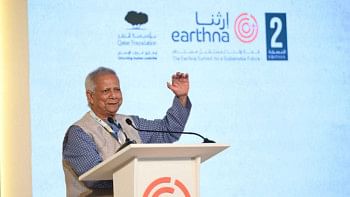Reliance wins approval for Bangladesh power plant
India's Reliance Power has won the approval to set up a 750-megawatt LNG-based power plant and an LNG terminal in Bangladesh, paving the way for $1.3 billion in potential investment in the country.
Bangladesh has in principle approved the first phase of Reliance Power's 3,000MW power project, the company said in a statement yesterday.
The 750MW power plant will be set up on a government-owned land at Meghnaghat in Narayanganj, said Mohammad Hossain, director general of Power Cell.
The floating LNG terminal to be built on Maheshkhali Island in Cox's Bazar will have the capacity to re-gasify and store two million tonnes of gas a year, which will be supplied to Reliance's plant with the surplus offered to Petrobangla.
“This additional LNG will help Bangladesh until the other units of Reliance Power come into operation,” said Hossain.
Reliance Power, India's leading private power generator, signed a preliminary agreement with Bangladesh to develop 3,000MW of capacity in phases during Indian Prime Minister Narendra Modi's visit last June.
It is now kicking off the project with 750MW as land for the remaining projects are not available yet.
“The government will not give any land to them. If Reliance can manage land, further contracts will be signed,” Hossain said.
The first phase will be commissioned in 24 months, said Reliance.
The company will use the equipment it had contracted for its Samalkot project in Andhra Pradesh for setting up the plant.
Reliance was implementing a 2,400MW gas-based power project at Samalkot in Andhra Pradesh.
The project was to be allocated gas from Reliance Industries' KG-D6 block, but due to a drastic decline in production, the project has not got any gas so far.
Reliance zeroed in on Meghnaghat because it is already a developed site connected to the national grid and has all the facilities to quickly install a power plant.
Building a plant in Maheshkhali would have taken extra few years as it has no readymade infrastructure.
The equipment will be under appropriate warranties from General Electric, the USA and other global suppliers.
“This will help set up the project on a fast-track basis,” said Reliance.
Meanwhile, Gujarat-based Adani Power, which is the largest private sector power producer in India, has also changed its plans for Bangladesh.
It had earlier said that it will invest $2.5 billion to build a 1,600MW coal-fired power plant. Now, Adani will set up a 3,000MW power plant in India and sell its electricity to Bangladesh, according to Hossain.
However, if Adani can manage land and coal it can sign a joint venture with Bangladesh for any future project, he added.
Bangladesh now imports 600MW of power from India to meet its growing demand for electricity.
Bangladesh is looking for outside help to meet its growing demand for power amid dwindling reserves of natural gas.
The country now generates, on average, 7,500MW of electricity, catering to only two-thirds of the population. The government plans to generate 24,000MW by 2021.

 For all latest news, follow The Daily Star's Google News channel.
For all latest news, follow The Daily Star's Google News channel. 



Comments